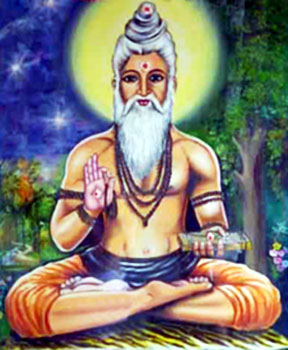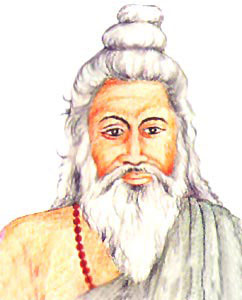 Horse Sacrifice of Dasaratha is one of the incidents narrated in the Bala Kanda of Ramayana by Valmiki. There was once a beautiful and a great city known as Ayodhya which was unconquerable in the country of Koshala. The subjects were righteous and happy, well read and contented, truthful, well provided with goods, self-restrained and charitable and full of faith. Their ruler was Dasharatha, a veritable Manu amongst men, and a moon amongst the stars. He had many wise counsellors including Kashyapa and Markandeya, and had two other saintly priests attached to his family, called Vashishtha and Vamadeva. To another great sage, Rishyasringa, he gave his daughter Santa. His ministers were such men who counsel and judge things finely; they were well versed in the arts of policy and ever fair-spoken. Only one desire of Dasharatha which was unsatisfied was that, he had no son to carry on his line.
Horse Sacrifice of Dasaratha is one of the incidents narrated in the Bala Kanda of Ramayana by Valmiki. There was once a beautiful and a great city known as Ayodhya which was unconquerable in the country of Koshala. The subjects were righteous and happy, well read and contented, truthful, well provided with goods, self-restrained and charitable and full of faith. Their ruler was Dasharatha, a veritable Manu amongst men, and a moon amongst the stars. He had many wise counsellors including Kashyapa and Markandeya, and had two other saintly priests attached to his family, called Vashishtha and Vamadeva. To another great sage, Rishyasringa, he gave his daughter Santa. His ministers were such men who counsel and judge things finely; they were well versed in the arts of policy and ever fair-spoken. Only one desire of Dasharatha which was unsatisfied was that, he had no son to carry on his line.
Since the king Dasaratha desperately needed a son to be his heir, after many vain austerities, he made up his mind at last on the greatest of all offerings - a horse sacrifice; and calling the family priests and other Brahmans, he gave all necessary orders for this undertaking. Then, returning to the inner rooms of the palace, he told his three wives what had been set afoot, whereat their faces shone with joy, like lotus-flowers in early spring. After almost a year from the date of horse sacrifice, the horse which was set free returned, and Rishyasringa and Vashishtha performed the ceremony, and there was great festivity and gladness. Then Rishyasringa told the king that four sons would be born to him, perpetuators of his race; at which sweet words the king rejoiced exceedingly. Now at this time all the deities were assembled there to receive their share of the offerings made, and being assembled together they approached Brahma with a petition.
 All the deities assembled in front of Brahma and requested him to help them from the evil works of the notorious rakshasa Ravana whom Lord Brahma granted a boon that he will not be slain by gandharvas, or yakshas, or rakshasas, or gods. Brahma replied that the evil rakshasa disdained to ask from him immunity from the attack of men and thus by man only the demon shall be slain. By hearing this, the deities rejoiced. At that time, arrived the great God Vishnu, clad in yellow robes, bearing mace and discus and conch, and riding upon Garuda. The deities reverenced, and prayed him to take birth as the four sons of Dasharatha for the destruction of the wily and irrepressible Ravana. Then that one of lotus-eyes, making of him four beings, chose Dasharatha for his father and disappeared. In a strange form, like a flaming tiger, he reappeared in the sacrificial fire of Dasharatha and, greeting him, named himself as the messenger of God. He told Dasaratha to distribute the divine milk and rice amongst his wives.
All the deities assembled in front of Brahma and requested him to help them from the evil works of the notorious rakshasa Ravana whom Lord Brahma granted a boon that he will not be slain by gandharvas, or yakshas, or rakshasas, or gods. Brahma replied that the evil rakshasa disdained to ask from him immunity from the attack of men and thus by man only the demon shall be slain. By hearing this, the deities rejoiced. At that time, arrived the great God Vishnu, clad in yellow robes, bearing mace and discus and conch, and riding upon Garuda. The deities reverenced, and prayed him to take birth as the four sons of Dasharatha for the destruction of the wily and irrepressible Ravana. Then that one of lotus-eyes, making of him four beings, chose Dasharatha for his father and disappeared. In a strange form, like a flaming tiger, he reappeared in the sacrificial fire of Dasharatha and, greeting him, named himself as the messenger of God. He told Dasaratha to distribute the divine milk and rice amongst his wives.
In due time four sons were born of them, sharing the self of Vishnu - from Kaushalya, Rama; from Kaikeyi, Bharata; and from Sumitra, Lakshmana and Satrughna; and these names were given to them by Vashishtha. Meanwhile the gods created mighty monkey-hosts, brave and wise and swift, shape-shifters, hardly to be slain, to be the helpers of the heroic Vishnu in the battle with the rakshasas. Thus starts the childhood days of the four sons of the King Dasaratha of Ayodhya.












